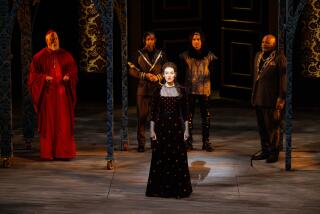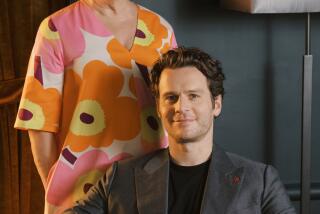The Merry, Rickety ‘Wives of Windsor’
- Share via
SAN DIEGO — Roger Rees’ new staging of “The Merry Wives of Windsor,” at the Old Globe’s outdoor Lowell Davies theater, falls victim to an age-old problem--the script is shaky Shakespeare.
“Wives” was the Bard’s version of a TV spinoff, where a secondary character from a popular series becomes the lead in his or her own show. And like most spinoffs, it doesn’t match the quality of the original. As the story goes, Queen Elizabeth I was so taken with the character of Sir John Falstaff, classically funny in both parts of “Henry IV,” that she wanted a full play about him. Shakespeare obliged, dashing off “Wives” in a couple of weeks for an upcoming royal celebration. It’s a valid explanation for the comedy’s prosaic style, underdeveloped secondary romance and meandering first act, all of which have challenged directors through subsequent centuries.
Rees’ twist is to set the play in Windsor, Ontario. It’s an intriguing idea and allows for a lot of staged Canadiana--like kids playing hockey on in-line skates--but doesn’t really add much in laughs or insight. And his depiction of Windsor doesn’t do the city any favors. To judge by Ralph Funicello’s urban-blight sets and Michael Gilliam’s neon-heavy lighting design, the city--generally considered an attractive and charming riverfront municipality--is grimy, graffiti-ridden and tawdry.
Wherever the locale, the plot is lean. Falstaff arrogantly boasts that he’ll bed two local wives, Mrs. Page and Mrs. Ford, and plunder their husbands’ fortunes. They learn of his plans and make him the fool, with Mrs. Ford also giving a lesson to her wildly jealous husband. Meanwhile, the Pages’ daughter has been pledged to one but loves another.
So the major hilarity of “Wives” stems from Falstaff repeatedly wooing Mrs. Ford, then avoiding her lethal spouse by such measures as hiding in a huge basket full of malodorous laundry or dressing as a woman. The major problem of “Wives” stems from the length of time it takes to get to those happenings.
Rees seeks to bridge the unfunny gaps and quicken the overall pace by changing and adding to the text and by keeping the cast, singularly and in groups, in motion. But such attempts succeed only sporadically.
The actors labor valiantly, particularly Dakin Matthews as Falstaff. He’s surprisingly nimble-footed in his padded bulk, and gets lots of laugh mileage out of his errant toupee and his climactic appearance “disguised” in stag’s horns. Jane Carr makes Mrs. Page a sprightly conniver, Katherine McGrath is a decorous go-between as Mistress Quickly and Arthur Hanket is manic as the jealous Mr. Ford.
Lewis Brown’s costumes feature generally appropriate modern dress, although Falstaff follower Pistol has the thrown-together appearance of something out of “The Road Warrior”; the policeman (here apparently named “Jacques Ruby”) is dressed as a Mountie, not too likely in non-Northwest Windsor; and valet Bardolph, who’s supposed to be ruddy-faced, looks like he has terminal sunburn.
The text changes include having the Falstaff-concealing laundry dumped into Lake Erie, but someone needed to check a map. Windsor to Lake Erie requires a journey of 10 to 15 miles--quite a hike, especially for two guys bearing Falstaff’s tonnage. Why not the bordering Detroit River?
*
“The Merry Wives of Windsor,” Lowell Davies Festival Theatre, Balboa Park, San Diego. Tuesdays-Sundays, 8 p.m. Ends Oct. 9. $23 to $39. (619) 239-2255. Running time: 2 hours, 50 minutes.
More to Read
The biggest entertainment stories
Get our big stories about Hollywood, film, television, music, arts, culture and more right in your inbox as soon as they publish.
You may occasionally receive promotional content from the Los Angeles Times.










